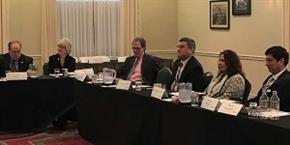Subscribe for Weekly Updates

Understanding the CPA-PAC, PICPA’s Political Action Committee
 By Alexandra Fabian, manager – PICPA government relations
By Alexandra Fabian, manager – PICPA government relations
Political action committees (PACs) play an important and necessary role in the political landscape, especially in election years. Unfortunately, they are often associated with negative feelings and notions of slimy politicians. This view of PACs is far from the reality.
PACs are organized for the purpose of raising and spending money to elect and defeat candidates. Most PACs represent business, labor, or ideological interests.
 |
|
Meeting of the CPA-PAC board. |
Did you know the PICPA has a PAC? The Certified Public Accountant Political Action Committee (CPA-PAC) is a nonpartisan, member-managed organization representing CPAs in public practice, industry, and government. CPA-PAC, the only PAC to specifically represent the interests of Pennsylvania CPAs, prides itself on taking a nonpartisan, facts-based stand on a variety of issues.
There’s a common misconception that PACs buy elections or legislators’ votes, or that they are “slush funds” for candidates. This is simply untrue. Candidates and PACs are required to abide by strict campaign finance laws. In fact, in Pennsylvania every political candidate and PAC must be registered with the Pennsylvania Department of State (DOS), and is required to file campaign finance reports throughout the year. These reports can be viewed on the DOS website at any time, providing complete transparency.
Another common misconception is that members’ dues fund the CPA-PAC. This is wrong, and it would actually be against state and federal law. While dues do fund the efforts of PICPA’s Harrisburg-based government relations team, funding for the CPA-PAC cannot come from your membership dues payment.
The CPA-PAC goes through a well-defined budgeting process to allocate funds at the beginning of each calendar year. With the help of the CPA-PAC board – a nonpartisan committee responsible for the generation and distribution of funds to state political candidates who support the CPA profession – estimated contributions are earmarked with the intent of supporting specific groups of candidates (i.e., House and Senate leadership, CPA legislators, key committee members, open seats and challengers, etc.). The PICPA government relations team cannot stray from the limits designated by the CPA-PAC board without the committee’s formal approval. CPA-PAC contributions, in concert with PICPA’s own advocacy efforts, safeguard the profession’s future by providing a voice in Harrisburg. A full list of CPA-PAC legislator contributions can be viewed here.
While there are occasional bad actors, by and large PACs help to elect the people whose record or vision is worthy of support. PACs also provide opportunities to build relationships with candidates by opening opportunities to engage with them in a more casual atmosphere, such as a golf outing or a luncheon. Attending a candidate’s fundraiser is one of the best ways to get noticed and taken seriously. Candidates want to hear from their constituents, but getting elected costs money. Thus, fundraising is crucial for any campaign. With only so many hours in a day, fundraisers are often the only opportunity to get a candidate’s ear.
When considering a donation to the CPA-PAC, understand how it fits with PICPA’s other government affairs activities. The mission of the CPA-PAC is to strive for the improvement of government by encouraging, stimulating, and providing the opportunity for CPAs to take a more active role in activities that affect Pennsylvania and its citizenry, and to provide support for candidates to statewide office in a number of categories. This enhances the efforts of the PICPA government relations team, which works with CPAs to engage in the process. Ultimately, both endorse the election of those candidates who take CPA-friendly stances.







Leave a commentOrder by
Newest on top Oldest on top